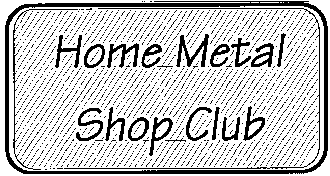
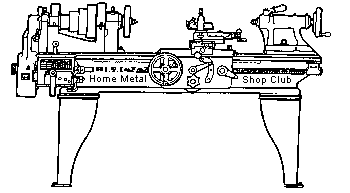
Volume 9, No 4- April, 2004
 |
 Volume 9, No 4- April, 2004 |
|
|
|
|
|
| President - |
Vice President - |
||
| Treasurer - |
Secretary - |
|
|
| Webmaster - |
Editors - |
||
| Founder - |
SIG Coordinators - |
Statement of Purpose
Membership is open to all those interested in machining metal and tinkering with machines. The club provides a forum for the exchanging of ideas and information. This includes, to a large degree, education in the art of machine tools and practices. Our web site endeavors to bring into the public domain written information that the hobbyist can understand and use. This makes an organization such as this even more important.Regular Meeting
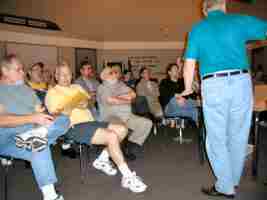 Collier Library, Houston Texas, 1:00 p.m., March
13, 2004, Tom Moore, President presiding. 27 members were present, including visitors Milton
Clerc, Gary Haskins, Laurence McGomery, and Robert Mate. Doug Chartier is working
on organizing a foundry field trip. He also circulated a list of members to
obtain their approval for publishing their names as the club roster. The
vice president was authorized to purchase a projector that connects to
a computer and a new projection screen.
Collier Library, Houston Texas, 1:00 p.m., March
13, 2004, Tom Moore, President presiding. 27 members were present, including visitors Milton
Clerc, Gary Haskins, Laurence McGomery, and Robert Mate. Doug Chartier is working
on organizing a foundry field trip. He also circulated a list of members to
obtain their approval for publishing their names as the club roster. The
vice president was authorized to purchase a projector that connects to
a computer and a new projection screen.
Business Meeting
Minutes are sent via email or regular mail to club members.
Presentation
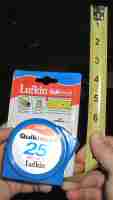
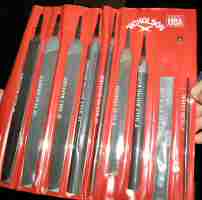

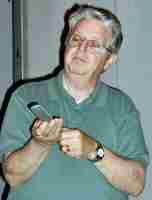
Joe Fay of Cooper Hand Tools, talked about the development and
construction of Nicholson hand files. Joe distributed a booklet - The Guide
to Files and Filing. He explained the three grades of American Pattern files
as SMOOTH, SECOND CUT and BASTARD. These names come from the condition
of the chisels that are used to cut the groves in the files. The rough chisel
marks left by the nearly spent chisel creates a bastard of a file. Joe
also showed some interesting rules with vertical numbering rather than the convention
horizontal numbers.
Show and Tell
|
|
|
|
|
Special Interest Groups Activity
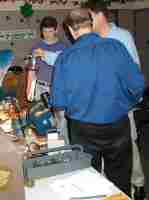 The
sharpening workshop equipment was demonstrated. The equipment included
a H.S. tool bit sharpener and a tool holder for correct angles by Joe Williams.
A "Drill Doctor" was brought in by Dick Kostelnick which seems
to do the best job of all the drill sharpening methods (4) tried. Rich
Pichler brought in a 6" grinder with a wheel dresser, an inexpensive ($40)
wet grinder, a $50 ceramic honing stone, water stones, diamond hones, a "Lansky"
knife sharpening kit, an old fashioned saw sharpening vise, and various sharpening
jigs to hold the various tools at the "best" angle. Hand axe
sharpening with a potable belt sander was demonstrated. One of the members
brought in an interesting 6" grinder that had an adjustable tool rest that
was marked off with common angles.Next month, if a VCR player magically appears,
the very elementary "Hand Tool Safety" tape from Cooper Tools and
perhaps a home tape of lathe work will be shown. In any case, it is planned
to do a hands-on drill sharpening session with each one that wants to try.
The
sharpening workshop equipment was demonstrated. The equipment included
a H.S. tool bit sharpener and a tool holder for correct angles by Joe Williams.
A "Drill Doctor" was brought in by Dick Kostelnick which seems
to do the best job of all the drill sharpening methods (4) tried. Rich
Pichler brought in a 6" grinder with a wheel dresser, an inexpensive ($40)
wet grinder, a $50 ceramic honing stone, water stones, diamond hones, a "Lansky"
knife sharpening kit, an old fashioned saw sharpening vise, and various sharpening
jigs to hold the various tools at the "best" angle. Hand axe
sharpening with a potable belt sander was demonstrated. One of the members
brought in an interesting 6" grinder that had an adjustable tool rest that
was marked off with common angles.Next month, if a VCR player magically appears,
the very elementary "Hand Tool Safety" tape from Cooper Tools and
perhaps a home tape of lathe work will be shown. In any case, it is planned
to do a hands-on drill sharpening session with each one that wants to try.
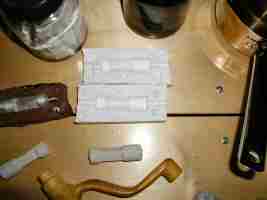
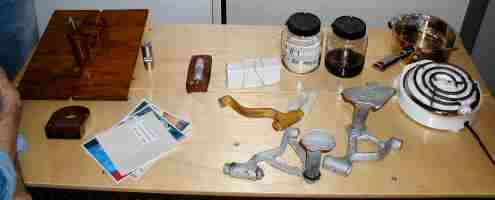
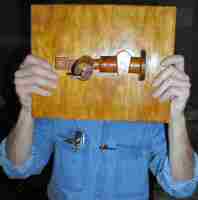 Ray Ethridge Showed the materials he uses to
make sand cores with a sodium silicate (water glass) binder that is fused with carbon dioxide
gas. He makes the core box from clay and uses Karo syrup as a core boxrelease
agent by mixing it with the sodium silicate and sand.
Ray Ethridge Showed the materials he uses to
make sand cores with a sodium silicate (water glass) binder that is fused with carbon dioxide
gas. He makes the core box from clay and uses Karo syrup as a core boxrelease
agent by mixing it with the sodium silicate and sand.
Ed Gladkowski (left photo) showed the pattern he used to make the gear box housing for his lathe mounted drill motor.
Featured Articles
Shaper Improvements
by
J. R. Williams - HMSC Member
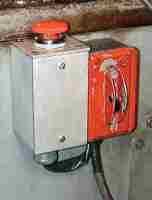 Shaper Switches:
An additional
switch was installed on my Logan Shaper, adjacent to the original On-Off
switch, to provide a rapid means of turning off the power to the motor. The original switch has a safety shroud
that does not fit my fingers and when the Emergency power switch became
available, it became an answer to my problem.
The switch has only to be pushed down to actuate it, and locks in the Off position. To restore
power, you have to turn the knob about a 1/4 turn.
Shaper Switches:
An additional
switch was installed on my Logan Shaper, adjacent to the original On-Off
switch, to provide a rapid means of turning off the power to the motor. The original switch has a safety shroud
that does not fit my fingers and when the Emergency power switch became
available, it became an answer to my problem.
The switch has only to be pushed down to actuate it, and locks in the Off position. To restore
power, you have to turn the knob about a 1/4 turn.
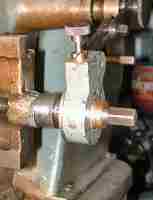 Shaper Feed
Ratchet Bushing: The feed mechanism
on my small Logan Shaper was showing it's age. A new ratchet pawl was
fabricated in an attempt to eliminate the intermittent operation problem. The new part helped but was not the
solution. The ratchet case operated on the shaft with the cast iron housing to
steel bearing surface and about 3/8-inch in width. I bored out the housing and machined an Oilite
bearing, with increased width, that was
pressed into the housing. Problem
solved.
Shaper Feed
Ratchet Bushing: The feed mechanism
on my small Logan Shaper was showing it's age. A new ratchet pawl was
fabricated in an attempt to eliminate the intermittent operation problem. The new part helped but was not the
solution. The ratchet case operated on the shaft with the cast iron housing to
steel bearing surface and about 3/8-inch in width. I bored out the housing and machined an Oilite
bearing, with increased width, that was
pressed into the housing. Problem
solved.
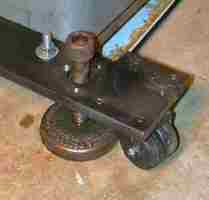 Shaper Casters
and Support: When I lifted the
Shaper off of my truck and set it down on the concrete floor, after a long trip
home, it was evident that a means of moving
the little unit was necessary. Rolling
it around on 1/2-in. steel pipe sections was not the answer and it is top
heavy. After locating four casters of
sufficient capacity and two sections of steel flat bar, I fabricated the two
support bars. The bars are 1/2-in.x 3-in. steel with additional sections
welded on the ends for the caster pads. This makes movement by one person easy.
The next problem was locking the casters. The unit came with four cast iron pads with waffle faced rubber
pads. I used four large socket head cap
screws with a rounded point to fit into the cast pads. The screws work in nuts
that have been turned down on the outside, leaving a small shoulder, and
pressed into holes drilled into the bars. This saves tapping the large holes
manually. I could install lock nuts on
the screws, but so far they have not been necessary.
Shaper Casters
and Support: When I lifted the
Shaper off of my truck and set it down on the concrete floor, after a long trip
home, it was evident that a means of moving
the little unit was necessary. Rolling
it around on 1/2-in. steel pipe sections was not the answer and it is top
heavy. After locating four casters of
sufficient capacity and two sections of steel flat bar, I fabricated the two
support bars. The bars are 1/2-in.x 3-in. steel with additional sections
welded on the ends for the caster pads. This makes movement by one person easy.
The next problem was locking the casters. The unit came with four cast iron pads with waffle faced rubber
pads. I used four large socket head cap
screws with a rounded point to fit into the cast pads. The screws work in nuts
that have been turned down on the outside, leaving a small shoulder, and
pressed into holes drilled into the bars. This saves tapping the large holes
manually. I could install lock nuts on
the screws, but so far they have not been necessary.
|
Visit Our Home Page at |
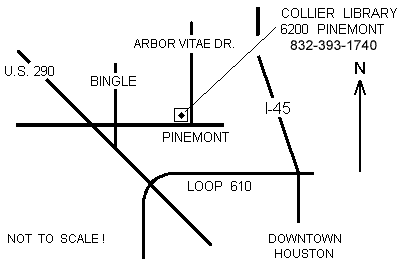 |
Right click below then select [Save
Target As...]
From Netscape select [Save Link As..]
Microsoft
Word version of this newsletter 132 KB
